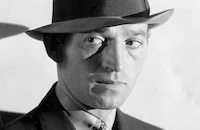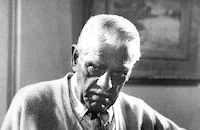Five Star Final

Brief Synopsis
Cast & Crew
Mervyn Leroy
Edward G. Robinson
Marian Marsh
H. B. Warner
Anthony Bushell
George E. Stone
Film Details
Technical Specs

Synopsis
When Bernard Hinchecliffe, the owner of the tabloid newspaper the New York Evening Gazette , pushes for increased circulation, Joseph Randall, the paper's managing editor, reluctantly digs up a twenty-year-old murder case involving Nancy Voorhees, who shot her unfaithful husband. Randall's secretary, Miss Taylor, who is secretly in love with him, disapproves of the planned article, but Randall goes ahead with it, assigning an unscrupulous reporter named Isopod to pose as a clergyman to get into Nancy Voorhees' home. Her old identity hidden, Nancy is now happily married to Michael Townsend, who gave up his social position to marry her, and is planning her daughter Jenny's wedding to society bachelor Phillip Weeks. The Townsends mistakenly think that Isopod is an assistant of the minister who is marrying Jenny and confess their fears of having Nancy's past exposed. Randall prints Isopod's story and when Phillip's parents read the news they demand that the wedding be cancelled. In total despair, Nancy commits suicide and when Michael finds her body, he too kills himself. Kitty Carmody, one of Randall's heartless reporters, finds the bodies, photographs them, and the Townsends once again make the headlines. Phillip stands up to his parents and insists on marrying Jenny, but in an uncontrollable rage, she goes to Randall and demands at gun point that he and the newspaper take responsibility for her parents' deaths. Fortunately, Phillip arrives and stops her from killing Randall. Randall accepts his guilt and quits the paper, followed by Miss Taylor.

Director

Mervyn Leroy
Cast

Edward G. Robinson

Marian Marsh

H. B. Warner

Anthony Bushell

George E. Stone
Frances Starr

Ona Munson

Boris Karloff

Aline Macmahon
Oscar Apfel
Purnell Pratt
Robert Elliott
Gladys Lloyd
Evelyn Hall
David Torrence
Crew
Thomas Brannigan
S. Charles Einfeld
John Ellis
Leo F. Forbstein
Gordon Hollingshead
Michael Joyce
Robert Lord
Earl Luick
R. G. Mitchell
Byron Morgan
Jack Okey
Sol Polito
Thomas Riddell
Frank Ware
Louis Weitzenkorn

Videos
Movie Clip



Trailer
Film Details
Technical Specs

Award Nominations
Best Picture
Articles
Five Star Final
The film wastes no time in establishing the opportunistic nature of the tabloid press from the get-go. Managing editor Joseph Randall (Edward G. Robinson) is ordered by Gazette owner Bernard Hinchecliffe (Oscar Apfel) to run a series of articles on the Voorhees case. Twenty years earlier Nancy Voorhees was demonized in newspapers for murdering her unfaithful fiancé after she became pregnant. Now she is happily married and planning her own daughter's wedding to Phillip Weeks (Anthony Bushell). But the resulting Gazette news stories have a cataclysmic effect, prompting Nancy and her husband to take extreme measures after facing the headlines and driving their daughter Jenny Voorhees into a state of hysteria.
In his autobiography, All My Yesterdays, Edward G. Robinson recalled Five Star Final saying, "Consider this story in the light of those who today believe in the unabridged right of the press to print anything (and God knows I am among them). But Weitzenkorn posed a dilemma that has to be considered along with the First Amendment. Does freedom of the press not carry with it some freedom of compassion, some freedom concerning the rights of the innocently involved? Okay. The ethics are one problem: the character I played is another. I loved Randall because he wasn't a gangster. I suspect he was conceived as an Anglo-Saxon. To look at me nobody would believe it, but I enjoyed doing him. He made sense, and thus I'm able to say that Five Star Final is one of my favorite films."
It's no surprise that Robinson would favor Five Star Final among his early films since the picture completely revolves around his character. And his first scene in the movie provides an important clue to his character; Randall is seen vigorously scrubbing his hands in the sink and it turns out it's a common joke around the office. Whenever Randall is missing in action, his staff checks to see if he's "washing up" in the bathroom. Does this sound like a man with a guilty conscience? In due time, Randall's conflicted feelings over his editorial responsibilities are firmly resolved in the face of a tragedy he set in motion.
Although the film rarely escapes its stage bound origins, it conveys an almost manic sense of urgency that seems completely right for its milieu. This was important to director Mervyn LeRoy who wrote in his autobiography Starmaker, "One concern I had in Five Star Final was to make sure that the newspaper office was authentic. Members of our staff in New York had sketches made of the interiors of two newspaper offices so that our dimensions were exactly correct. We even duplicated the neon lighting in the ceilings by having exceptionally bright arc lights blazing down from the top of the studio sound stage. Eddie Robinson loved the part of the dishonest editor, Randall...I went down on the set day after day to watch him work. Eddie's attack, his vigor, his electric energy, made you forget he was a small and ugly man. He was a towering figure in pictures - a great star."
While Edward G. Robinson is clearly the star of Five Star Final, there are several supporting players who shine in roles that are little more than caricatures in the script. Aline MacMahon as Randall's world-weary secretary is also a no-nonsense feminist whose comments on the Voorhees case are all too true: "I think you can always get people interested in the crucifixion of a woman." She also has a directness with Randall that comes out in their wisecrack patter and lines like "If you want my opinion, take me to a speakeasy. I'm not working for you then." Other standouts are Frances Starr, a former New York stage actress, as the doomed Nancy Voorhees and Ona Munson (her claim to fame is playing Belle Watling in Gone With the Wind, 1939) as the shameless and opportunistic street reporter Kitty Carmody. Best of all is Boris Karloff as the obsequious T. Vernon Isopod (who came up with this name?), an expelled divinity student now posing as a clergyman in order to get inside information on the Voorhees case. Karloff credits co-star and friend George E. Stone with getting him hired for Five Star Final plus the fact that he had already impressed Mervyn LeRoy with his performance that same year in The Mad Genius. In fact, Karloff made a total of 16 films in 1931 with the most famous one being Frankenstein (1931), the movie that truly launched his film career.
Seen today Five Star Final has the subtlety of a sledgehammer and the tone is often as shrill and overbearing as a carny hawking his star attraction. Yet it all seems perfectly in keeping with its sordid story and is often fascinating for its Pre-Code take on morality and ethics. Upon its release, The Motion Picture Herald proclaimed it "crackerjack entertainment" and Variety wrote that "this talker totes a sock and its finish wallop can't be ducked." No finer compliments could be bought and just in case you didn't get the film's message, it's summed up for you graphically under "The End" credit - a discarded copy of the Gazette is swept along by a street cleaner into the muck of the gutter.
Producer: Hal B. Wallis
Director: Mervyn LeRoy
Screenplay: Louis Weitzenkorn (play), Byron Morgan, Robert Lord
Cinematography: Sol Polito
Film Editing: Frank Ware
Art Direction: Jack Okey
Music: Leo F. Forbstein
Cast: Edward G. Robinson (Joseph W. Randall), Marian Marsh (Jenny Townsend), H. B. Warner (Michael Townsend), Anthony Bushell (Phillip Weeks), George E. Stone (Ziggie Feinstein), Frances Starr (Nancy Townsend), Ona Munson (Kitty Carmody).
BW-90m.
by Jeff Stafford

Five Star Final
Quotes
Trivia
Notes
Aline MacMahon made her motion picture debut in this film. According to Hal Wallis' autobiography, Wallis was concerned that the newspaper office seem authentic, and to this end, his staff made sketches of the interiors of two newpaper offices in order to create exactly correct dimensions. The film was nominated for an Academy Award in the Best Production category. Five Star Final was the first film in which actress Marian Marsh (1913-2006) was billed under that name. She made two feature films in 1930, at which time she was credited as Marilyn Morgan. Modern sources list additional cast members as: Harold Waldridge (Arthur Goldberg), Polly Walters (Telephonist), James Donlan (Reporter) and Frank Darien (Schwartz). According to modern sources the newspaper was inspired by Bernarr McFadden's New York Graphic. The film was remade by Warner Bros. in 1936 as Two Against the World starring Humphrey Bogart (see below).















